Achi Soup- A Traditional Dish Amongst Southeastern Nigeria
Achi soup is a beloved traditional dish in Nigerian cuisine, especially among the Rivers, Ibibio, and Efik communities in southeastern Nigeria. Known as “Ofe Achi” in the Igbo language, this soup is one of Nigeria’s most cherished varieties. While it shares similarities with cocoyam soup, it stands out with its unique taste and texture. Achi soup is particularly popular in Rivers State and throughout Eastern Nigeria, with variations often including periwinkles to enhance its flavor.
In Rivers, periwinkles are usually added to achi soup and in fact, almost every other type of soup. Many people prefer achi soup because it is simpler to prepare compared to cocoyam soup, which requires boiling and pounding cocoyam. Additionally, achi is more budget-friendly than cocoyam in today’s Nigerian markets.
This rich and hearty soup is made from achi seeds, which are ground into a powder and used as a thickening agent. With its distinctive slightly nutty flavor and creamy texture, achi soup is typically cooked with a variety of proteins such as meat, dried fish, and crayfish. It is commonly enjoyed with fufu, pounded yam, or other starchy sides, making it a staple in many Nigerian households. Beyond being just a comfort food, achi soup holds cultural significance and is often served at special occasions and family gatherings.
Ingredients used in Achi Soup
- 2kg / 4.4lb meat (chicken and cow tripe)
- 2 cups periwinkles
- 1/2 cup achi
- Utazi leaves
- 1/2 cup crayfish
- 1tbsp pepper soup spice
- 200g dried fish
- 300ml palm oil
- 8 scotch bonnet peppers
- Salt to taste.
Recipe time: 90 Minutes
Serving: 12 persons
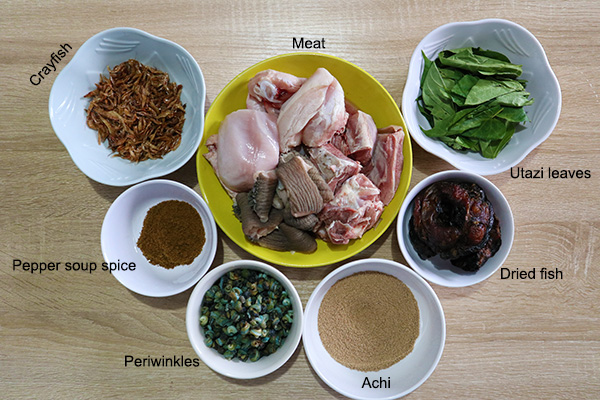
Achi Soup Recipe
Step 1
Wash and season meat with one stock cube and salt, set on heat, and bring to a boil. Cook for 10-15 minutes, remove the chicken if you are using soft chicken.
Step 2
Add 2 cups of water and continue cooking the cow tripe till it is soft and easy to chew.
Step 3
Add 10-12 cups of water, using recommended 250ml cups. If you are familiar with Nigerian soups, you will soon stop using cups.
Step 4
Add palm oil, ground crayfish, and the pepper soup spice. Let the soup boil for 10 minutes.
Step 5
Add 3 tbsp of achi, cover the pot, and cook to dissolve. Observe after 10 minutes.
Add salt to taste, and add the chicken you previously removed.
If the soup is not thick, you can add an extra teaspoon of achi, you don’t want it too thick.
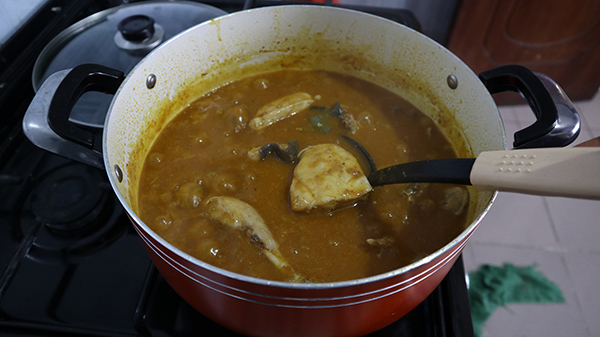
Step 6
Stir, cover halfway, and let the soup simmer on medium heat for 10-15 minutes. Stir in between, you don’t want your soup sticking to the bottom of the pot.
Taste for salt, and add the sliced utazi leaves. let the soup simmer on low heat for 3-5 minutes.
Serve with eba, fufu, or pounded yam.
Is Achi Soup Good for the Body?
Yes, achi soup is very good for the body. Achi powder is a fantastic ingredient for thickening soups. It adds a unique and delicious flavor to the soup, making them taste fresh and savory. Besides enhancing flavor, it has medicinal benefits and is a great seasoning. It’s also rich in antioxidants, which are good for your health. You can use achi powder in soups, stews, and sauces, and it’s very nutritious, providing plenty of vitamins(vitamin A, vitamin B6, vitamin C) magnesium and protein. These nutrients are beneficial for overall health and help support your body in various ways.
Cultural Importance
Achi soup carries substantial cultural importance, especially in the southeastern regions of Nigeria, among the Rivers, Ibibio, and Efik communities. Let’s explore its cultural significance in details.
1. Social and Cultural Context: Achi soup is more than just a dish; It is commonly served during special events such as weddings, ceremonies, and communal gatherings, reinforcing its status as a dish of celebration and unity.
2. Traditional Beliefs: In traditional Nigerian culture, foods like achi soup are believed to possess health benefits and are often cooked with care to reflect great respect for guests and tradition.
3. Variations: Different regions and families have their own variations of achi soup. For instance, some might use more or less achi powder to adjust the thickness, or incorporate local herbs and spices for a unique twist, whilst Rivers people add periwinkles to their achi soup.
Is Achi Soup Cheap?
Absolutely! Achi soup is a very cheap and affordable compared to many other Nigerian soups.
Economic and Practical Aspects
Cost-Effectiveness: Achi is more affordable than some other traditional ingredients like cocoyam, making it a practical choice for many households. This aspect also reflects the adaptability and resourcefulness of the community in managing their culinary practices.
Local Ingredients: Using locally sourced ingredients such as achi seeds supports the local economy and highlights the community’s reliance on indigenous plants and agricultural practices.
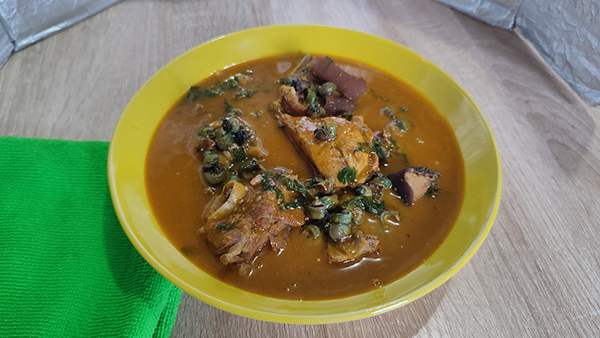
Achi Soup - Cheap Nigerian Soup
Ingredients
- 2 kg meat chicken and cow tripe
- 2 cups periwinkles
- 1/2 cup achi
- 1/2 cup Sliced utazi leaves
- 1/2 cup Crayfish
- 1 tbsp Pepper soup spice
- 200 g dried fish
- 300 ml palm oil
- 8 scotch bonnet peppers
- Salt to taste.
Instructions
- Wash and season the meat with one stock cube and salt. Place it on the heat and bring to a boil. Cook for 10-15 minutes, and remove the chicken if you're using tender chicken.
- Add 2 cups of water and continue cooking the cow tripe until it becomes tender and easy to chew.
- Add 10-12 cups of water, using 250ml cups. If you’re experienced with Nigerian soups, you’ll eventually stop needing to measure with cups.
- Stir in the palm oil, ground crayfish, and pepper soup spice. Let the soup simmer for 10 minutes.
- Add 3 tablespoons of achi, cover the pot, and cook until it dissolves. Check the consistency after 10 minutes.
- Season with salt to taste, then return the chicken you set aside earlier.
- If the soup is not thick, you can add an extra teaspoon of achi, you don’t want it too thick.
- Stir the soup, cover partially, and let it simmer on medium heat for 10-15 minutes. Stir occasionally to prevent the soup from sticking to the bottom of the pot.
- Taste for salt and then add the sliced utazi leaves. Let the soup simmer on low heat for 3-5 minutes.
- Accompany with eba, fufu, or pounded yam.

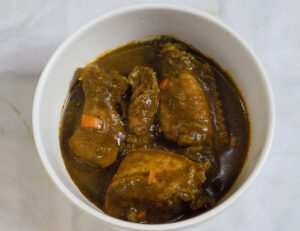
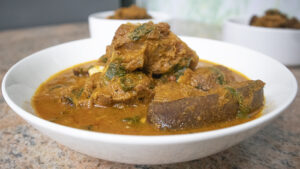

7 Responses
Another favourite meal is definitely Eba paired with Achi Soup! Your book has truly transformed my kitchen story and experience. Please keep sharing your wonderful recipes for the general public.
Found your blog while reading your cookbook. Thanks for the inputs you make in the foodosphere, I have been trying all the recipes and so far, they keep turning out great.
I have made achi soup for a very long time now. I tried your recipe and it turned out better.
My kids love this soup, I have not been very good with cooking but getting better by following the same way you write them down.
Can I use rabbit meat instead, I am growing fond of it instead of cow meat.
I am sure you can use any meat.
This supposedly cheap soup isn’t so cheap anymore according to the market prices. But it’s still one of the affordable soups in Nigeria.